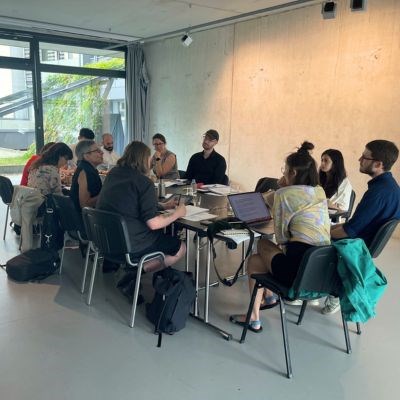The fifth iteration of the SLU Urban Futures PhD Criticality course, Criticality in Research/Criticality as Praxis, took place during late summer and early fall 2023. The course explored how to mobilize the insightful force of critical thinking to enrich one’s research, contribute constructively to the work of colleagues, and evolve epistemological norms and received practices towards new forms of knowledge production.
Trans-, inter-, and multi-disciplinary learning
Focused on helping researchers develop synthetic critical thinking processes and skills, the course challenges students to reflect on their approach to and ambitions for their own work and that of their peers. The ten participants met in August at feldfünf, a cultural and social platform located in the Former Flower Market urban development in Berlin’s Kreuzberg neighbourhood. Originating from the global north and global south, they brought varied academic, professional and life experiences to the table; the group represented diverse educational backgrounds - in landscape architecture, architecture, environmental science, education, communication and media, planning, activism, urban design, and urban studies. In addition to SLU, students joined from Lund University, the Oslo School of Architecture and Design, TU Delft, KU Leuven, NTNU, and the Hungarian University of Agriculture and Life Sciences. The varied mix of their PhD projects, with case studies in China, South Africa, Ecuador, Northern Ireland, the Netherlands, Sweden, and Norway generated enriching discussions for all.
Criticality in research and praxis
Landscape scholar Prof. Wolff (University of Toronto) kick-started the Berlin seminar with a presentation on the motivations, methods and questions driving her critical research practice. Wolff then engaged in a generous follow-up exchange over Zoom with individual students eager to dig deeper into her process. To explore criticality in professional and academic contexts, course leaders, Prof. Dr. Lisa Diedrich and Prof. Andrea Kahn gave talks centered on assigned literature related to practices of and theories behind critical research. Seminar time was split between group discussion of texts on critical theory, critical thinking, criticality and reflexivity and group discussions animated by the participants’ PhD research practices and projects. Critical reading and writing exercises helped students frame their own critical work, and give feedback on each other’s works-in-progress.
By all accounts, the experience proved valuable for those who joined. According to one student in their 2nd year of PhD work “the course exceeded my expectations. It has really helped me to be more precise in the way I write and talk about my research.” Another just starting their PhD project noted “the course offers you the luxury of spending worthwhile time digging deep into your own process and praxis as a researcher.”
2023 Criticality PhD Students reflect on their course experience:
“Criticality in Research/Criticality as Praxis offers you the luxury of spending worthwhile time digging deep into your own process and praxis as a researcher. I can’t recommend the course enough to any curious and open-minded aspiring researcher in the architecture, planning or design disciplines.”
“In this course I finally encountered the possibility of concretizing my academic interests and backgrounds in transdisciplinarity, landscape planning, and criticality. The course has a central understanding of justice and equity as important in a world where discourses can be shaped!”
“The interaction with other young researchers taught me valuable lessons that will help me in the development of my future research. It motivated me to develop skills to argue and debate theory in an academic setting, to listen and to produce arguments that fit into a conversation, to think more rigorously about what I want to say and the words I choose to say it.”
“The ‘Criticality in Research/Criticality as Praxis’ course is rich in theory, methodology and experience. I particularly enjoyed the shared learning within the small but diverse group of participants and look forward to continued exchanges with the fellow researchers I met during the course.”
“This has been one of the most collaborative and interactive workshops I have ever participated in. Everyone prepared well, respected each other's work and time, and shared a very congenial spirit. We will stay in touch and continue to exchange work even once the course is completed.”
